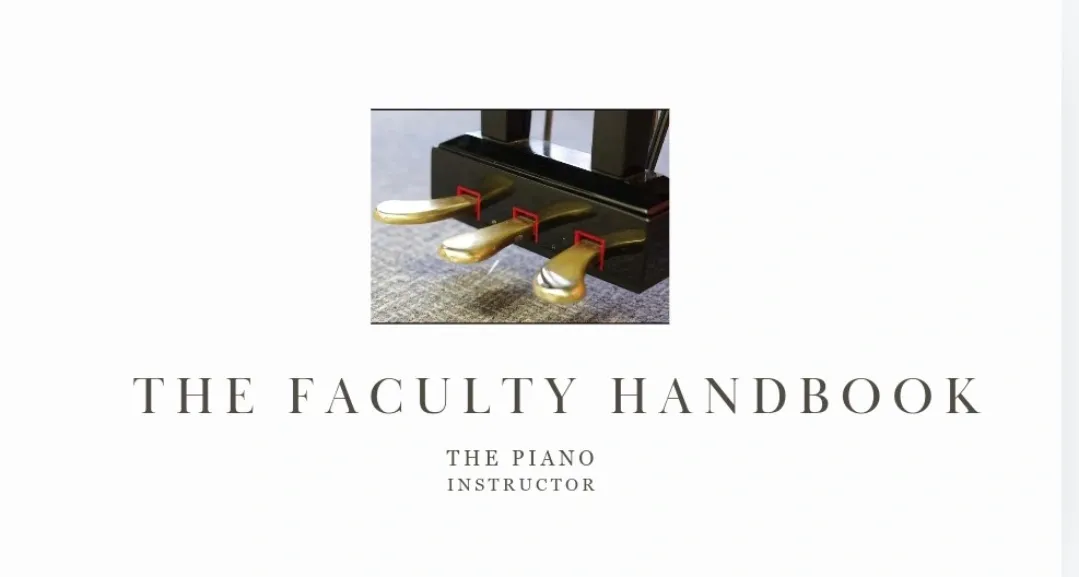Believing in possibility, The Boundaries (Part Deux)
The Faculty Handbook

In a previous post, I explained that believing in your students is Job One when you’ve made the conscientious decision to become a leader in your field and guide other people into the joy that is music.
Believing in your students is not merely thinking to yourself, “That kid’s got it!”.
The commitment is:
You’ll do what you can as an educator—a role which provides certain parameters—to help the student achieve their goals.
We need to talk about the parameters.
Those are your boundaries.
When I train teachers, we talk about if they believe in the students…and how they plan to reflect that belief with their curriculum, with their rules, with their expectations.
When I say my students knew I believed in them, it means:
- I had standards and I stuck to them.
My standards had to do with meeting their goals: either for competition, for grades, for personal technique expansion, or some such.
So, for example, let’s say a person wanted to learn Für Elise by Beethoven.
I would find out why they wanted to learn it first.
Then, we would work in the usual way, with joy and intention. Mishaps will occur, so I will tap into the emotional connection when times get rough, when the student struggles on certain passages or when learning new notes or accidentals. Their “why” is what keeps most students active and engaged, but few teachers ever find out why they want to learn certain things.
It’s the tiny things that make students know you care. This translates into personal life, by the way.
When I learn their why, I’d research everything I can on the subject of their why, and make sure I showed up prepared to answer any question surrounding their why, as well as their questions regarding how to do this or that on the piano.
No one can ever say I am ill-prepared. Ever. - The standards were the same for everyone, but the way we approached the standards differed depending on ability, time allocated to practice, life style, and so on.
A 50-year-old father of four is going to have different needs from a ten-year-old homeschooled child. They are at different stages of life, they are at different developmental stages physically and emotionally, they have different vocabularies, wildly different life experiences, and so on.
If you’re teaching Für Elise exactly the same way to both, you will encounter frustrations. This is where learning educational pedagogy is crtitical. - Love was the leader in the room.
We loved our music. We loved dancing in the room. We loved banging on percussion to practice rhythm and timing. We loved recording the lessons and recording their music and having them copyright their works and showing off their certificates of ownership and certificates of advancement in the lessons.
I didn’t seek to make my lessons entertaining. I am entertaining. I’m an entertainer!
I didn’t seek to help students become composers as a gimmick or whatever. I am a composer, who has works copywritten, and who understands that intellectual property can pay you over and over and over, so it’s a natural part of the lessons that we discuss how to protect the work they created.
When you’re walking around as a sixth grader with a credit to your name recorded by the U.S. Copyright Office, you’re going to take your music more seriously. I guarantee it.
This is why I rarely had issues with practice. I never asked my students if they practiced. I asked them what they were working on, because I really wanted to know. I am always curious to learn what folks are working on. I ask a lot of questions because people are interesting.
In addition, that question (for my purposes) was far more expansive and quite often included difficult musical choices that they were making independently and were far and above what I assigned, because they believed in themselves. My expectations are high, so they figured if I think they can do it, maybe they can, so they rose to meet those expectations.
Think of it this way:
When students don’t think you believe in them, they won't try. Why should they? Would you work as hard for a teacher who is constantly putting you down? Or would you really study for someone who seems like they are giving you tips and tricks and theory and technique with passion and from experience?
When students know you won’t accept any ole behavior from them, that you expect them to practice, that you expect them to show up on time, and if they know that you practice, that you’re working on music, that you’re performing and studying and that all of this is The Norm for you, your students quite often will meet your expectations, and sometimes exceed them.
Believing in possibility includes all of this—loving what you do, letting your light shine, having standards and sticking to them, not accepting ridiculous behavior, and having specific, quantifiable goals.
We teach this.
This is significant:
According to The Institute for Multi-sensory Learning:
Good teachers are the foundation of good schools, and when leaders invest time and money into enhancing educators’ knowledge and skills, there are significant positive impacts. In fact, research suggests that teachers who receive substantial, high-quality professional development can boost their students’ achievement by roughly 21 percentage points.
We are certified teachers, teacher trainers, and performing musicians.
Who better to train your teachers to help your students succeed?
